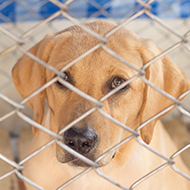
The new test will allow people to be reunited more quickly with their pets.
Ukrainian nationals seeking refuge in the UK will be able to access a new rabies blood test that will reduce the time their pets need to spend in quarantine.
Announced by the Department for Environment, Food and Rural Affairs (DEFRA) on Monday (4 April), the new test will be able to detect existing rabies vaccinations and help in instances where refugees have travelled without the relevant paperwork.
The department said: 'Results can be turned around in as little as two days with animals moving to home isolation if they are found to have rabies antibodies. This will help maintain our strict biosecurity measures, speed up the rehoming process, and allow people to be reunited more quickly with their pets.
'We are working with vets and quarantine facilities to make sure that the arrival of Ukrainians in the UK is not delayed by the process to make arrangements for their pets.'
The announcement forms part of a package of emergency measures introduced in March to help people fleeing Ukraine with their pets. Using an emergency licence, Ukrainian nationals can bring their animals to the UK, with any vaccination, microchipping and quarantine costs met by the government.
Animal welfare minister Lord Goldsmith said: “People having to flee Ukraine are in an appalling situation. I’m pleased that Ukrainian refugees will be able to bring their pets to the UK with any quarantine costs paid for by the Government.
“As part of our new streamlined process, any animals which have already received some treatment may also have their stay in quarantine reduced and be returned back to their owner as soon as possible.”
Owing to the limited number of quarantine facilities in the UK, people fleeing Ukraine with their pets will be prioritised over animals brought over on a commercial basis, including rescue imports.
The UK's Chief Veterinary Officer Christine Middlemiss recently urged rehoming charities to ensure that rescued animals entering the country have the necessary vaccination paperwork.
APHA border checks discovered that a shipment of 19 animals imported by a rescue charity travelled illegally on falsified rabies documentation.



 The latest
The latest